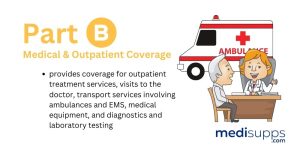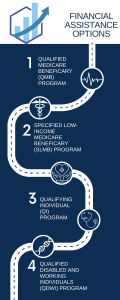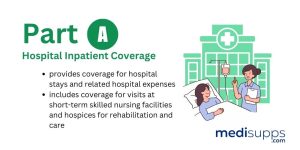
by Russell Noga | Updated September 6th, 2023
 Medicare Open Enrollment is a critical time for beneficiaries to evaluate and modify their healthcare coverage to best suit their needs. But navigating the maze of options can be daunting.
Medicare Open Enrollment is a critical time for beneficiaries to evaluate and modify their healthcare coverage to best suit their needs. But navigating the maze of options can be daunting.
In this comprehensive guide, we will walk you through everything you need to know about Medicare Open Enrollment, empowering you to make informed decisions about your healthcare coverage.
Short Summary
- Medicare Open Enrollment takes place from October 15 to December 7, with coverage changes effective on January 1st.
- Original Medicare (Parts A and B) is the basic coverage provided by the federal government while Medicare Advantage (Part C) offers additional benefits for higher out-of-pocket costs.
- During this period, beneficiaries should compare plan options, consider their needs and future health needs, use available resources & review Annual Notice of Change to ensure optimal healthcare coverage at minimal cost.
Understanding Medicare Open Enrollment
Medicare Open Enrollment is an annual period where beneficiaries can review and modify their coverage plans to better accommodate their requirements during the annual enrollment period. One might wonder, who can take advantage of this period?
Medicare Open Enrollment is only available to those who are already enrolled in Medicare and want to amend their Medicare coverage.
The timeline for Medicare Open Enrollment is crucial. Here are the key periods to keep in mind:
- General enrollment period: January 1 to March 31
- Initial Enrollment Period for Medicare: Three months prior to the beneficiary’s 65th birthday to three months thereafter.
- As of January 1, 2023, there is a reduced coverage gap between the time one signs up for their Medicare plan, including Medicare Advantage coverage, and the time their coverage commences.
Neglecting to observe Medicare Open Enrollment may have a detrimental effect on beneficiaries’ healthcare coverage.
For instance, seven out of ten beneficiaries did not evaluate their coverage options, including choosing one Medicare Advantage plan over another, during a recent open enrollment period. Therefore, it is essential to be proactive and informed during this critical time.
 Dates and Deadlines for Medicare Open Enrollment
Dates and Deadlines for Medicare Open Enrollment
Medicare Open Enrollment takes place from October 15 to December 7, with coverage changes, including prescription drug plan alterations, taking effect on January 1.
It’s important to note that this period is strictly for individuals who are already enrolled in Medicare, as beneficiaries can enroll in Medicare during their initial enrollment period, which generally encompasses the three months prior to and after their 65th birthday month, along with their birthday month.
In addition to the Medicare Open Enrollment period, there is also a Medicare Advantage open enrollment period that extends from January 1 to March 31. This period provides beneficiaries the opportunity to make modifications to their Medicare Advantage plan if they are dissatisfied with it after the Medicare Open Enrollment.
Coverage commences on January 1st for all alterations made during Medicare Open Enrollment, including changes to creditable prescription drug coverage.
If a beneficiary alters their coverage plan multiple times during the Medicare Open Enrollment period, the final plan selection made during this period shall be the plan that takes effect on January 1.
Discover 2024 Plans & Rates
Enter Zip Code
Original Medicare vs. Medicare Advantage
Original Medicare, which consists of Parts A and B, is the basic coverage provided by the federal government. On the other hand, Medicare Advantage (Part C) offers an alternative with additional benefits.
But what are the key differences between these two options, and which one might be right for you?
In the following subsections, we will delve deeper into the specifics of Original Medicare (Parts A and B) and Medicare Advantage (Part C) to help you make an informed decision about your healthcare coverage.
Original Medicare (Parts A and B)
Original Medicare is the basic coverage provided by the federal government. It comprises of two main parts, Part A and Part B. Part A covers inpatient hospital care, skilled nursing facility care, hospice care, and some home health care, while Part B covers physician visits, preventive care, outpatient care, durable medical equipment, and some home health care.
However, Original Medicare does not provide coverage for vision, hearing, dental care, prescription drugs, long-term care, or custodial care. To address these gaps, many individuals opt for additional medicare health plans.

To address these coverage gaps, some beneficiaries choose to purchase supplemental insurance, also known as Medigap insurance. The Medicare Supplement Insurance open enrollment period is a six-month window of opportunity for beneficiaries aged 65 and above.
It starts on the first day of the month when they are enrolled with Medicare Part B. During this window, insurers handling Medigap coverage are obligated not to deny a policy regardless of any chronic medical conditions, weight, smoking status, or other illnesses.
However, failing to register in Medicare during the initial enrollment period may result in penalties and delays in coverage. Should a beneficiary fail to register during their initial enrollment period, they must wait for Medicare’s general enrollment period from January 1 to March 31 annually, at which point coverage will commence on July 1 and late penalties may be incurred.
Medicare Advantage (Part C)
Medicare Advantage (Part C) is a private alternative to Original Medicare, offering additional benefits such as:
- Dental coverage
- Vision coverage
- Prescription drug coverage
- Hearing coverage
- Gym memberships
- Transportation
- Over-the-counter medications
Certain plans may also present other extra benefits. Medicare Advantage plans generally provide additional benefits compared to Original Medicare.
However, Medicare Advantage plans may involve higher out-of-pocket costs than Original Medicare and may not provide coverage for all of the services that Original Medicare covers.
Therefore, it is essential for Medicare Advantage beneficiaries to take into account the specific prescription drug coverage built into their MA plan when contemplating whether to remain with their current plan or switch plans during open enrollment.
In conclusion, Medicare Advantage (Part C) is a private alternative to Original Medicare, often including additional benefits such as dental, vision, and prescription drug coverage. It is crucial for beneficiaries to weigh the pros and cons of each option and consider their unique healthcare needs when making a decision.
Navigating Prescription Drug Plans (Part D)
Part D prescription drug plans are supplemental plans that can be added to Original Medicare or included in Medicare Advantage plans. During Medicare Open Enrollment, it is essential to evaluate coverage and costs associated with Part D prescription drug plans, whether as part of Original Medicare or Medicare Advantage.
To assess your prescription drug plan during open enrollment, beneficiaries should:
- Ascertain if the medications they take are still covered under their current plan and at what cost.
- Ascertain what pharmacies are preferred by their current plan.
- Ascertain if they can save money by obtaining their drugs through the mail, and ascertain if their plan offers that.
The Inflation Reduction Act of 2022 will have a major impact on the payments made by Medicare beneficiaries towards their prescriptions. They will be paying less out of their own pocket.
Starting from 2024, those with catastrophic illnesses will start to incur expenses. Once the threshold level has been reached, prescription costs will be covered without incurring additional out-of-pocket expenses. This helps to reduce healthcare costs for the patient.
Starting in 2025, prescription drug costs you pay out of pocket won’t exceed $2,000 a year. No more stressing about exceeding your budget for medication!
Making Changes During Medicare Open Enrollment
During Medicare open enrollment, beneficiaries have several options to modify their healthcare coverage. They may opt to:
- Alter their Medicare Advantage plan
- Switch from a Medicare Advantage plan without drug coverage to one with drug coverage
- Substitute one Medicare drug plan for another
- Discontinue Medicare prescription drug coverage.
It’s important to remember that this period is an opportunity to switch between Original Medicare and Medicare Advantage, alter their Part D or Medicare Advantage plans, and explore other potential options.
However, should you revert to Original Medicare during open enrollment and seek Medicare Supplement Insurance, you may be liable to pay more than anticipated for a supplement policy, or you may be refused coverage.
The Medicare Supplement Insurance open enrollment period starts when beneficiaries turn 65 and join Medicare Part B. It’s a six-month window, beginning on the first day of that month.
Beneficiaries should be aware of these enrollment periods and the potential consequences of not taking action during these critical times.
Financial Assistance Options for Medicare Beneficiaries

Limited-income beneficiaries may qualify for financial assistance through various programs, such as Medicare Savings Programs and Extra Help during open enrollment.
The four Medicare Savings Programs are the Qualified Medicare Beneficiary (QMB) Program, the Specified Low-Income Medicare Beneficiary (SLMB) Program, the Qualifying Individual (QI) Program, and the Qualified Disabled and Working Individuals (QDWI) Program. These programs assist in covering Medicare premiums, deductibles, and copayments.
Eligibility and benefits vary by state and individual circumstances, but generally, the following programs provide assistance with Medicare costs:
- QMB Program: Covers Medicare premiums, deductibles, and copayments.
- SLMB Program: Provides assistance with Medicare premiums.
- QI Program: Offers aid with Medicare premiums.
- QDWI Program: Facilitates payment of Medicare premiums.
The Extra Help program is a federal program that assists low-income Medicare beneficiaries in covering their prescription drug costs. In order to receive full benefits, a person’s yearly income must be at least 135% of the federal poverty guidelines. For example, an individual’s income must be at least $18,347 in 2022.
Beneficiaries should explore these financial assistance options, including Medicaid services, if they are struggling with the costs of their Medicare coverage.
Tips for a Successful Medicare Open Enrollment Experience
To ensure a successful open enrollment experience, it is crucial to:
- Compare plan options
- Consider coverage needs
- Contemplate current and potential future health needs
- Consult with licensed sales agents or Medicare directly
- Make use of live chat assistance or the 24-hour hotline for open enrollment inquiries
Beneficiaries should take these steps to navigate the open enrollment process effectively.
Lastly, it’s important to examine your Annual Notice of Change for any modifications in benefits or costs of your plan. This document is sent to beneficiaries annually and should be thoroughly reviewed to determine if your plan is still the most suitable choice.
The Impact of Not Changing Your Medicare Plan
Failing to change or review your Medicare plan during open enrollment may result in increased costs, changes in benefits, and potential gaps in coverage.
Existing coverage will renew for the year 2023; however, it may come with modifications in terms of cost and benefits. Therefore, it is essential to be proactive and informed during this critical time.
Neglecting to modify or examine your Medicare plan during open enrollment may lead to augmented expenses, alterations in advantages, and potential voids in coverage. By staying informed and taking advantage of the resources available, beneficiaries can make the most of their Medicare coverage and avoid potential pitfalls.
Summary
In conclusion, Medicare Open Enrollment is a crucial time for beneficiaries to evaluate and modify their healthcare coverage.
By understanding the various components of Medicare, comparing plan options, considering coverage needs, and seeking assistance from professionals, beneficiaries can make informed decisions for their healthcare future.
Remember that knowledge is power, and taking control of your Medicare coverage during open enrollment can lead to better healthcare outcomes and potentially lower costs. So, take advantage of this crucial period and make the most of your Medicare benefits.
Compare 2024 Plans & Rates
Enter Zip Code
Frequently Asked Questions
What is Medicare Open Enrollment?
Medicare Open Enrollment is an annual period during which Medicare beneficiaries can make changes to their healthcare coverage. It typically occurs from October 15th to December 7th each year.
What can I do during Medicare Open Enrollment?
During Medicare Open Enrollment, you can make various changes to your coverage, such as switching from Original Medicare to a Medicare Advantage plan, changing your Medicare Advantage plan, or joining or switching prescription drug plans (Part D).
When does Medicare Open Enrollment begin and end?
Medicare Open Enrollment starts on October 15th and ends on December 7th each year. Any changes made during this period take effect on January 1st of the following year.
Can I switch from Original Medicare to a Medicare Advantage plan during Open Enrollment?
Yes, you can switch from Original Medicare (Part A and B) to a Medicare Advantage plan (Part C) during Medicare Open Enrollment. This allows you to access additional benefits.
Can I switch from a Medicare Advantage plan to Original Medicare during Open Enrollment?
Yes, you can switch from a Medicare Advantage plan back to Original Medicare during Open Enrollment. You can also enroll in a standalone Part D prescription drug plan at this time.
What should I consider when choosing a new Medicare plan during Open Enrollment?
When choosing a new Medicare plan, consider your healthcare needs, prescription drug coverage, network of doctors and hospitals, and the plan’s costs, including premiums, deductibles, and copayments.
Is Open Enrollment the only time I can make changes to my Medicare coverage?
No, there are other special enrollment periods for specific situations, such as moving to a new area or losing other coverage. However, Medicare Open Enrollment is the most common time for beneficiaries to make changes.
Can I enroll in a Medigap (Medicare Supplement) plan during Open Enrollment?
You can apply for a Medigap plan at any time, but the best time to do so is during your Medigap Open Enrollment Period, which starts when you’re 65 and enrolled in Part B. During this period, you have guaranteed issue rights.
What happens if I miss the Medicare Open Enrollment period?
Missing the Medicare Open Enrollment period may limit your options for making changes to your coverage. You may need to wait until the next Open Enrollment period to make changes, and your new coverage won’t take effect until January 1st of the following year.
Where can I get assistance or information about Medicare Open Enrollment?
You can get assistance and information about Medicare Open Enrollment from Medicare.gov, your State Health Insurance Assistance Program (SHIP), or by contacting Medicare directly at 1-800-MEDICARE.
Russell Noga is the CEO and Medicare editor of Medisupps.com. His 15 years of experience in the Medicare insurance market includes being a licensed Medicare insurance broker in all 50 states. He is frequently featured as a featured as a keynote Medicare event speaker, has authored hundreds of Medicare content pages, and hosts the very popular Medisupps.com Medicare Youtube channel. His expertise includes Medicare, Medigap insurance, Medicare Advantage plans, and Medicare Part D.




